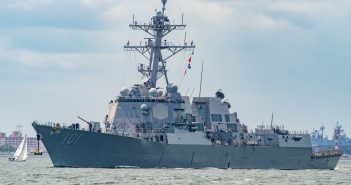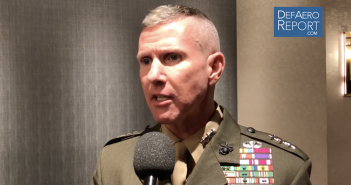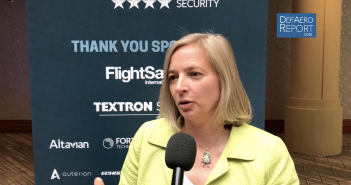![Defense & Aerospace Report Podcast [Aug 26, 2019 Monday Business Report]](https://defaeroreport.com/wp-content/uploads/2019/08/g7-351x185.jpeg)
Defense & Aerospace Report Podcast [Aug 26, 2019 Monday Business Report]
On this episode of the Business Podcast, sponsored by Bell, we discuss the week on world markets…
![Defense & Aerospace Report Podcast [Aug 26, 2019 Monday Business Report]](https://defaeroreport.com/wp-content/uploads/2019/08/g7-351x185.jpeg)
On this episode of the Business Podcast, sponsored by Bell, we discuss the week on world markets…

NORFOLK, Va. — The Navy has scheduled selective early retirement boards for O-5’s and O-6’s for the second year in a row. Navy officials estimate 2,500 captains and commanders will get a look by one of next month’s two boards. The commander’s board starts Sept. 11. The captain’s board follows on Sept. 20.

NORFOLK, Va. — A flotilla of multi-national warships is operating off the U.S. East Coast, training for high-end ops at sea with the U.S. Navy in a move that help better integrate the combined sea-based muscle of the North Atlantic Treaty Organization’s maritime forces.

Lt. Gen. Eric Smith, USMC, the commander of the US Marine Corps Combat Development Command, discusses how the new guidance from Gen. David Berger, USMC, the Marine Corps commandant impacts planning, priorities in the Pacific, autonomous systems and more with Defense & Aerospace Report Editor Vago Muradian at AUVSI’s 2019 conference in Washington, DC.

Helen Greiner, one of the co-founders of iRobot who is now a highly qualified expert on robotics, autonomous systems and artificial intelligence to the assistant secretary of the Army for acquisition, technology and logistics, discusses autonomy, new technologies, countering dependence on Chinese technology and raising a new generation of American scientists and engineers with Defense & Aerospace Report Editor Vago Muradian at AUVSI’s 2019 conference in Washington, DC.
![Defense & Aerospace Podcast [Friday Roundtable Aug 23, 2019]](https://defaeroreport.com/wp-content/uploads/2019/08/Screen-Shot-2019-08-22-at-6.11.33-PM-351x185.png)
On this Roundtable episode of the Defense & Aerospace Report Podcast, sponsored by Bell, a…

On August 20th, 1968, hundreds of thousands of Warsaw Pact troops and tanks invaded Czechoslovakia to end the liberalization of the “Prague Spring,” in what became the largest military action in Europe since the end of World War II.
Czechoslovakia had been run by a pro-Soviet Communist government since 1948, imposing strict political, social and economic policies. By the 1960s, Czechoslovakia had been undergoing de-stalinization like many Eastern bloc countries, but proceeded more slowly and was accompanied by economic struggles.
In January 1968, following years of pressure for economic reforms and liberalization from academic, literary and student groups, the Czechoslovakian Central Committee unanimously elected Slovak Alexander Dubceck as first secretary. Dubceck quickly embraced popular calls for major reforms, advocating for a move towards personal, political and press freedoms, economic liberalization and increased autonomy for Slovakia in what he described as “socialism with a human face.”
These reforms proved too threatening to Soviet interests, and on orders from Soviet Premier Leonid Brezhniev, Warsaw Pact troops invaded Czechoslovakia overnight from Aug. 20th to 21st, 1968. Though facing no military resistance, citizens across the country protested and resisted, attempting to slow the invading forces with homemade barricades. Dozens of citizens were killed, and ultimately Dubceck and his policies were removed from office. It would take until 1989 for democratic reforms to finally take hold in the country.
![Defense & Aerospace Report Podcast [Aug 19, 2019 Monday Business Report]](https://defaeroreport.com/wp-content/uploads/2019/08/Screen-Shot-2019-08-18-at-6.51.44-AM-351x185.png)
On this episode of the Business Podcast, sponsored by Bell, we discuss the week on…
![Defense & Aerospace Podcast [Friday Roundtable Aug 16, 2019]](https://defaeroreport.com/wp-content/uploads/2019/08/Screen-Shot-2019-08-15-at-5.43.12-PM-e1565905658212.png)
On this Roundtable episode of the Defense & Aerospace Report Podcast, sponsored by Bell, a…

Dan Milford, the chief executive of Chironix, discusses the Perth, Australia-based company’s efforts to create high-level perception for robots and autonomous systems for military and commercial applications with Defense & Aerospace Report Editor Vago Muradian at the Australian Embassy in Washington, DC.
